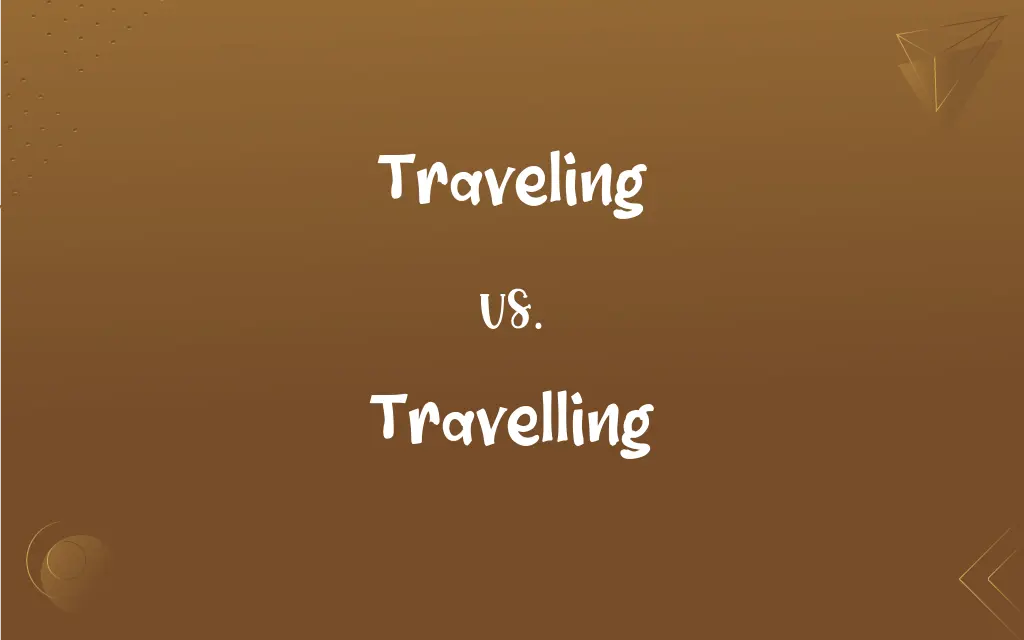Traveling vs. Travelling: What's the Difference?
Edited by Janet White || By Harlon Moss || Updated on October 22, 2023
"Traveling" is American English while "travelling" is British English; both mean going from one place to another.

Key Differences
"Traveling" and "travelling" both refer to the act of moving from one location to another. However, their spelling difference is indicative of regional variations in English.
"Traveling" is the standard spelling in American English. Conversely, "travelling" is how the word is spelled in British English.
While they are used in the same context and convey the same meaning, the choice of which to use depends on the audience or region being addressed. It's crucial to note that both spellings are grammatically correct, but their usage is region-specific.
In essence, understanding the distinction is important for consistency, especially in formal writing, but in informal contexts, either is likely to be understood.
Comparison Chart
Spelling
Single 'l'
Double 'l'
ADVERTISEMENT
Origin
American English
British English
Usage
Used in the U.S.
Used in the U.K., Canada, Australia, etc.
Pronunciation
Similar to "travelling"
Similar to "traveling"
Meaning
Going from one place to another
Going from one place to another
Traveling and Travelling Definitions
Traveling
Journeying, especially to distant places.
My traveling adventures took me across three continents.
ADVERTISEMENT
Travelling
Being in constant motion.
She spent her 20s as a travelling artist.
Traveling
The act of moving from one place to another.
She's always traveling for work.
Travelling
Journeying over a long distance.
After travelling through Europe, she felt more culturally enriched.
Traveling
Used to describe something designed for use while on the go.
She bought a traveling kit for her skincare.
Travelling
Designed for use during journeys.
He packed his travelling bag for the weekend trip.
Traveling
Moving or passing through a specific area.
The traveling circus attracted large crowds.
Travelling
Relating to the movement or passage through an area.
The travelling exhibition was a hit in every city.
Traveling
Being constantly on the move.
As a traveling salesperson, he's rarely home.
Travelling
The activity of moving from one place to another.
His love for travelling is evident in his photo collection.
Traveling
To go from one place to another, as on a trip; journey.
Travelling
To go from one place to another, as on a trip; journey.
Traveling
To go from place to place as a salesperson or agent.
FAQs
Are both spellings correct?
Yes, both spellings are grammatically correct.
Are "traveling" and "travelling" the same?
Yes, they both refer to the act of moving from one place to another; the difference is in the spelling.
Can I use "travelling" in American writings?
While it would be understood, "traveling" is the preferred American spelling.
How many 'l's are in the American version?
One 'l' – "traveling."
Is the meaning of both words identical?
Yes, they both denote the act of moving from one location to another.
Why do the two spellings exist?
They reflect regional variations in English spelling.
Is "travelling" used in other countries besides the U.K.?
Yes, "travelling" is also used in countries like Canada, Australia, and New Zealand.
Which spelling is older?
Both have deep roots in English, but regional preferences have evolved over time.
In which countries is "traveling" predominantly used?
"Traveling" is predominantly used in the U.S.
Are there exceptions in usage?
While the rules generally hold, individual preference or exposure to both forms can lead to varied usage.
Do they have the same pronunciation?
Yes, both words are pronounced similarly.
Do both words have the same derivatives?
Yes, like "traveler" (American) and "traveller" (British).
How can I remember which is which?
Think of "traveling" with one 'l' for "America" and "travelling" with two 'l's for "London."
Which one is American English?
"Traveling" is American English.
Which spelling is British?
"Travelling" is British English.
How many 'l's are in the British version?
Two 'l's – "travelling."
Can I interchange them in writing?
It's best to choose one based on your audience and maintain consistency.
Are there other words with similar American and British spelling differences?
Yes, like "color" (American) and "colour" (British).
Do grammar checkers recognize both?
Yes, most checkers recognize both, but may suggest one over the other based on settings.
Is one more formal than the other?
No, the formality is the same; the choice depends on regional preference.
About Author
Written by
Harlon MossHarlon is a seasoned quality moderator and accomplished content writer for Difference Wiki. An alumnus of the prestigious University of California, he earned his degree in Computer Science. Leveraging his academic background, Harlon brings a meticulous and informed perspective to his work, ensuring content accuracy and excellence.
Edited by
Janet WhiteJanet White has been an esteemed writer and blogger for Difference Wiki. Holding a Master's degree in Science and Medical Journalism from the prestigious Boston University, she has consistently demonstrated her expertise and passion for her field. When she's not immersed in her work, Janet relishes her time exercising, delving into a good book, and cherishing moments with friends and family.































































